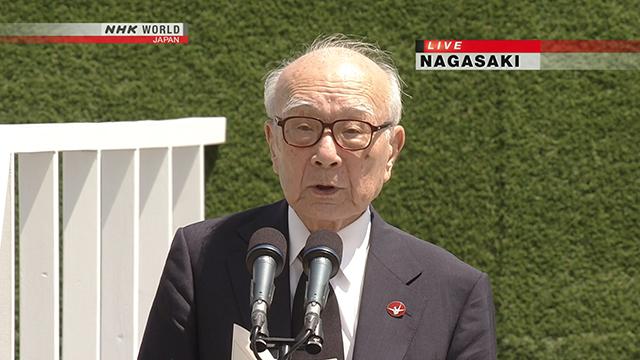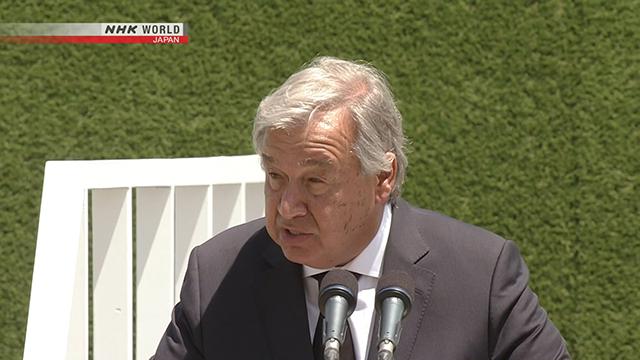73 Years of Silence

The city's Peace Park observed a moment of silence at 11:02 AM--the exact moment the bomb exploded in 1945. The average age of the remaining survivors, known as hibakusha, is now over 82.
"To this day, I cannot erase from my memory the horrifying scene I witnessed," said survivor Terumi Tanaka at the ceremony. "It will continue to haunt the hibakusha until the day they die. Of all the things humans can do to one another, this is one that can never be forgiven or tolerated."

A Year on From Adoption of the Treaty
The anniversary comes as a year has passed since the Treaty on the Prohibition of Nuclear Weapons was adopted at the UN. Nuclear powers such as the US and Russia didn't support it and have not signed on. Japan, which is protected by America's nuclear umbrella, has also not signed. For the treaty to come into force, it needs to be ratified by 50 countries. So far only 14 have.

The mayor of Nagasaki appealed to nuclear powers and the countries that depend on their protection to abandon the weapons. He then specifically called on the Japanese government.
"I strongly request that you change your security policies," said Tomihisa Taue. "I urge you to do so before humanity once again commits a mistake. I hereby ask that the Government of Japan, the only country to have suffered from the wartime use of nuclear weapons, support the nuclear weapons ban treaty."
Prime Minister Shinzo Abe maintains Japan will not sign the treaty. He has said his country shares the treaty's goal of abolishing nuclear weapons, but not its approach.
"To truly achieve a world without nuclear weapons, we need to start by clearly understanding that nuclear bomb attacks have tragic results," Abe said, speaking after the mayor. "We also need to get cooperation from countries with and without nuclear weapons. Japan is determined to act as a bridge between the two sides and lead the efforts of the international community."
Guterres meets Hibakusha
UN Secretary-General Antonio Guterres was among the dignitaries from more than 70 countries. His leadership is being sought in the effort to make the treaty come into force.
Upon his arrival in Nagasaki, Guterres took part in a dialogue with a group of hibakusha. He said he wanted to hear their stories in person.
"Hibakusha could not live like human beings, but could not die either," said one participant. "Nuclear weapons are our most brutal enemy that will destroy the entire planet," said another.
"You are really heroes. You represent the best of humankind," Guterres said. "And your testimony is an extremely powerful one."
He spent twice as long as was scheduled to talk to the hibakusha.

On the morning of August 9th, Guterres visited the Nagasaki Atomic Bomb Museum.
He watched a reproduction of what happened immediately after the nuclear bomb was dropped. He learned that 150,000 of Nagasaki's population of 240,000 were killed or wounded.
"I was high commissioner for refugees for 10 years," Guterres said later at a news conference. "And I've seen horrible suffering all over the world, but I never witnessed anything similar to what they were able to describe of the tragedy of Nagasaki."
He left a message in the museum's guest book. "Hiroshima-Nagasaki never again"

Determination at the Ceremony
At the memorial service after meeting the hibakusha, Guterres expressed his resolve to work to abolish nuclear weapons.
"From the other side of the apocalypse, the hibakusha have raised their voices on behalf of the entire human family. We must listen to them."
"Here in Nagasaki, I call on countries to commit to nuclear disarmament and to start making visible progress as a matter of urgency."

Guterres spoke to NHK after completing his itinerary in Nagasaki. "We need to take profits from the enormous energy of the hibakusha. We need to mobilize the youth, the civil society, the public opinion, put pressure on governments. "
The UN Secretary-General says he was greatly strengthened by the hibakusha in Nagasaki. How he will convert that strength into action remains to be seen.
